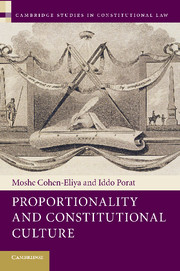21 results
5 - The Administrative Origins of Constitutional Rights and Global Constitutionalism
- from Part II - Proportionality and the United States
-
-
- Book:
- Proportionality
- Published online:
- 28 September 2017
- Print publication:
- 21 September 2017, pp 101-102
-
- Chapter
- Export citation
The Formal and the Substantive Meanings of Proportionality in the Supreme Court's Decision Regarding the Security Fence
-
- Journal:
- Israel Law Review / Volume 38 / Issue 1-2 / Spring Winter 2005
- Published online by Cambridge University Press:
- 04 July 2014, pp. 262-291
- Print publication:
- Spring Winter 2005
-
- Article
- Export citation
Series page
-
- Book:
- Proportionality and Constitutional Culture
- Published online:
- 05 June 2013
- Print publication:
- 13 June 2013, pp ii-iv
-
- Chapter
- Export citation
Acknowledgments
-
- Book:
- Proportionality and Constitutional Culture
- Published online:
- 05 June 2013
- Print publication:
- 13 June 2013, pp xii-xiv
-
- Chapter
- Export citation
Dedication
-
- Book:
- Proportionality and Constitutional Culture
- Published online:
- 05 June 2013
- Print publication:
- 13 June 2013, pp vii-viii
-
- Chapter
- Export citation
Copyright page
-
- Book:
- Proportionality and Constitutional Culture
- Published online:
- 05 June 2013
- Print publication:
- 13 June 2013, pp vi-vi
-
- Chapter
- Export citation
Proportionality and constitutional culture - Title page
-
-
- Book:
- Proportionality and Constitutional Culture
- Published online:
- 05 June 2013
- Print publication:
- 13 June 2013, pp v-v
-
- Chapter
- Export citation
5 - Epistemology
-
- Book:
- Proportionality and Constitutional Culture
- Published online:
- 05 June 2013
- Print publication:
- 13 June 2013, pp 82-102
-
- Chapter
- Export citation
1 - The globalspread of proportionality and some analytical similarities with balancing
-
- Book:
- Proportionality and Constitutional Culture
- Published online:
- 05 June 2013
- Print publication:
- 13 June 2013, pp 10-23
-
- Chapter
- Export citation
Index
-
- Book:
- Proportionality and Constitutional Culture
- Published online:
- 05 June 2013
- Print publication:
- 13 June 2013, pp 159-168
-
- Chapter
- Export citation
7 - The effects of proportionality
-
- Book:
- Proportionality and Constitutional Culture
- Published online:
- 05 June 2013
- Print publication:
- 13 June 2013, pp 133-152
-
- Chapter
- Export citation
Contents
-
- Book:
- Proportionality and Constitutional Culture
- Published online:
- 05 June 2013
- Print publication:
- 13 June 2013, pp ix-xi
-
- Chapter
- Export citation
Proportionality and Constitutional Culture - Half title page
-
- Book:
- Proportionality and Constitutional Culture
- Published online:
- 05 June 2013
- Print publication:
- 13 June 2013, pp i-i
-
- Chapter
- Export citation
6 - Justification and authority
-
- Book:
- Proportionality and Constitutional Culture
- Published online:
- 05 June 2013
- Print publication:
- 13 June 2013, pp 103-132
-
- Chapter
- Export citation
4 - Impact, intent and indifference
-
- Book:
- Proportionality and Constitutional Culture
- Published online:
- 05 June 2013
- Print publication:
- 13 June 2013, pp 64-81
-
- Chapter
- Export citation
3 - Culture
-
- Book:
- Proportionality and Constitutional Culture
- Published online:
- 05 June 2013
- Print publication:
- 13 June 2013, pp 44-63
-
- Chapter
- Export citation
2 - History
-
- Book:
- Proportionality and Constitutional Culture
- Published online:
- 05 June 2013
- Print publication:
- 13 June 2013, pp 24-43
-
- Chapter
- Export citation
Introduction
-
- Book:
- Proportionality and Constitutional Culture
- Published online:
- 05 June 2013
- Print publication:
- 13 June 2013, pp 1-9
-
- Chapter
- Export citation
Conclusion
-
- Book:
- Proportionality and Constitutional Culture
- Published online:
- 05 June 2013
- Print publication:
- 13 June 2013, pp 153-158
-
- Chapter
- Export citation

Proportionality and Constitutional Culture
-
- Published online:
- 05 June 2013
- Print publication:
- 13 June 2013

